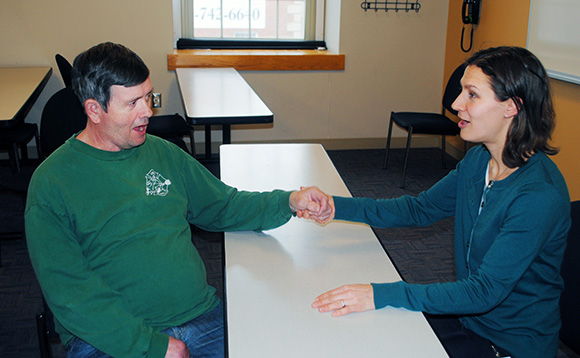2010 New Investigators Research Award
Melodious Start

Lauryn Zipse believes firmly in the need to integrate speech-language pathology and research. For clear evidence, just look to her work in Melodic Intonation Therapy.
This treatment was developed in the 1970s, based on the observation that some people with aphasia can sing much more fluently than they can speak. Zipse’s research provides valuable insight into the use of this therapy on language recovery.
Melodic Intonation Therapy includes two musical elements, modified singing and rhythmic hand tapping, which are thought to support speech production. However, rhythm may be difficult for some people with aphasia. Zipse’s work tested this idea by looking at the ability of people with aphasia to tap simple rhythms and detect changes in rhythms they hear. She found that many people with aphasia did indeed show difficulties in this area.
Zipse’s 2010 ASHFoundation New Investigators Research Award helped yield essential pilot data for her work, allowed her to hire a research assistant, and led to ASHA Convention posters, a presentation at the Clinical Aphasiology Conference, and an upcoming research article.
And that was only the beginning. Zipse’s initial ASHFoundation funding just keeps on giving. The award has resulted in a number of studies, explains Zipse, “related to prosodic and rhythmic processing abilities involved in speech planning and the degree to which these abilities may be preserved in aphasia.” In addition, her research into Melodic Intonation Therapy, which she is currently carrying out as an assistant professor at the MGH Institute of Health Professions, is continuing. This work addresses whether rhythmic tapping is a helpful treatment component, and whether that depends on the rhythmic abilities of a person with aphasia. As Zipse explains, “Therapy is not ‘one-size fits all.’ We have to investigate what works best for whom.”

The ASHFoundation funding has resulted in another project that Zipse is hoping will lead to an NIH grant application. This work involves the timing of a certain type of neural activity in the brain and how this may influence auditory attention in people with aphasia. On the surface, she says, “The work funded by the ASHFoundation and this other project seem quite different, but the ASHFoundation-funded project really did have a big influence on the development of this new work.”
Zipse is obviously well aware that her ASHFoundation award helped lay the basis for her own future work. But more research from more people is vitally needed.
“In order to increase evidence that results in the improvement of service delivery to individuals with communication disorders,” she believes, “we need a cohort of people dedicated to research with this goal. The ASHFoundation provides opportunities for supporting the research of such individuals and thus expanding the cohort. The benefits of supporting the ASHFoundation ultimately touch all individuals with communication disorders.”
View More Recipient Spotlights